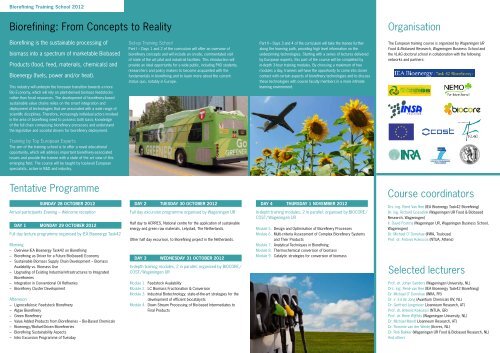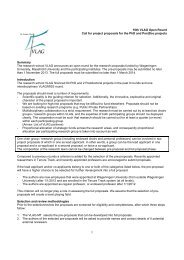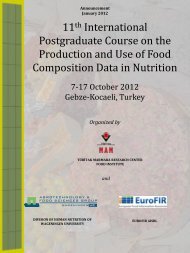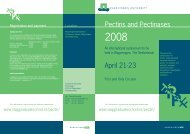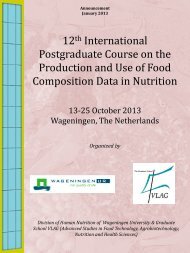Biorefining Training School 2012
Biorefining Training School 2012
Biorefining Training School 2012
Create successful ePaper yourself
Turn your PDF publications into a flip-book with our unique Google optimized e-Paper software.
<strong>Biorefining</strong> <strong>Training</strong> <strong>School</strong> <strong>2012</strong><strong>Biorefining</strong>: From Concepts to RealityOrganisation<strong>Biorefining</strong> is the sustainable processing ofbiomass into a spectrum of marketable BiobasedProducts (food, feed, materials, chemicals) andBioenergy (fuels, power and/or heat).This industry will underpin the foreseen transition towards a moreBio Economy, which will rely on plant-derived biomass feedstocksrather than fossil resources. The development of biorefinery-basedsustainable value chains relies on the smart integration anddeployment of technologies that are associated with a wide range ofscientific disciplines. Therefore, increasingly individual actors involvedin the area of biorefining need to possess both basic knowledgeof the full chain composing biorefinery processes and understandthe legislative and societal drivers for biorefinery deployment.Set-up <strong>Training</strong> <strong>School</strong>Part I – Days 1 and 2 of the curriculum will offer an overview ofbiorefinery concepts and will include an on-site, commentated visitof state of the art pilot and industrial facilities. This introduction willprovide an ideal opportunity for a wide public, including PhD students,researchers and policy makers to become acquainted with thefundamentals in biorefining and to learn more about the currentstatus quo, notably in Europe.Part II – Days 3 and 4 of the curriculum will take the trainee furtheralong the learning path, providing high level information on theunderpinning technologies. Starting with a series of lectures deliveredby European experts, this part of the course will be completed byin-depth 3-hour training modules. By choosing a maximum of twomodules a day, trainees will have the opportunity to come into closercontact with certain aspects of biorefinery technologies and to discussthese technologies with course faculty members in a more intimatelearning environment.The European training course is organized by Wageningen URFood & Biobased Research, Wageningen Business <strong>School</strong> andthe VLAG doctoral school in collaboration with the followingnetworks and partners:<strong>Training</strong> by Top European ExpertsThe aim of the training school is to offer a novel educationalopportunity, which will address important biorefinery-associatedissues and provide the trainee with a state of the art view of thisemerging field. The course will be taught by top-level Europeanspecialists, active in R&D and industry.Tentative ProgrammeCourse coordinatorsSunday 28 October <strong>2012</strong>Arrival participants Evening – Welcome receptionDay 1 Monday 29 October <strong>2012</strong>Full day lecture programme organised by IEA Bioenergy Task42Morning– Overview IEA Bioenergy Task42 on <strong>Biorefining</strong>– <strong>Biorefining</strong> as Driver for a Future Bio(based) Economy– Sustainable Biomass Supply Chain Development – BiomassAvailability vs. Biomass Use– Upgrading of Existing Industrial Infrastructures to IntegratedBiorefineries– Integration in Conventional Oil Refineries– Biorefinery Cluster DevelopmentAfternoon– Lignocellulosic Feedstock Biorefinery– Algae Biorefinery– Green Biorefinery– Value Added Products from Biorefineries – Bio-Based Chemicals– Bioenergy / Biofuel-Driven Biorefineries– <strong>Biorefining</strong> Sustainability Aspects– Intro Excursion Programme of TuesdayDay 2 Tuesday 30 October <strong>2012</strong>Full day excursion programme organised by Wageningen URHalf day to ACRRES, National centre for the application of sustainableenergy and green raw materials, Lelystad, The Netherlands.Other half day excursion, to <strong>Biorefining</strong> project in the Netherlands.Day 3 Wednesday 31 October <strong>2012</strong>In-depth training modules, 2 in parallel, organised by BIOCORE /COST / Wageningen URModule 1. Feedstock AvailabilityModule 2. LC Biomass Fractionation & ConversionModule 3. Industrial Biotechnology: state-of-the-art strategies for thedevelopment of efficient biocatalystsModule 4. Down Stream Processing of Bio-based Intermediates toFinal ProductsDay 4 Thursday 1 November <strong>2012</strong>In-depth training modules, 2 in parallel, organised by BIOCORE /COST / Wageningen URModule 5. Design and Optimisation of Biorefinery ProcessesModule 6. Multi-criteria Assessment of Complex Biorefinery Systemsand Their ProductsModule 7. Analytical Techniques in <strong>Biorefining</strong>Module 8. Thermochemical conversion of biomassModule 9. Catalytic strategies for conversion of biomassDrs. ing. René Van Ree (IEA Bioenergy Task42 <strong>Biorefining</strong>)Dr. ing. Richard Gosselink (Wageningen UR Food & BiobasedResearch, Wageningen)Ir. David Postma (Wageningen UR, Wageningen Business <strong>School</strong>,Wageningen)Dr. Michael O’ Donohue (INRA, Toulouse)Prof. dr. Antonis Kokossis (NTUA, Athens)Selected lecturersProf. dr. Johan Sanders (Wageningen University, NL)Drs. ing. René van Ree (IEA Bioenergy Task42 <strong>Biorefining</strong>)Dr. Michael O’ Donohue (INRA, FR)Dr. ir. Ed de Jong (Avantium Chemicals BV, NL)Dr. Gerfried Jungmeier (Joanneum Research, AT)Prof. dr. Antonis Kokossis (NTUA, GR)Prof. dr. René Wijffels (Wageningen University, NL)Dr. Michael Mandl (Joanneum Research, AT)Dr. Rommie van der Weide (Acrres, NL)Dr. Rob Bakker (Wageningen UR Food & Biobased Research, NL)And others


